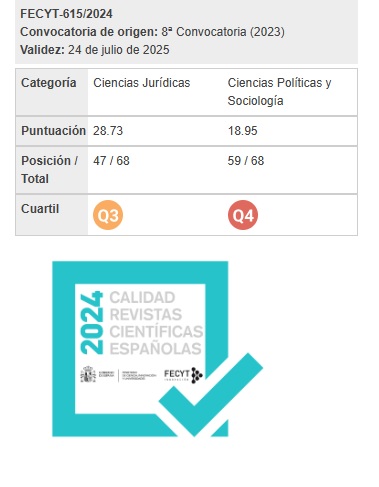Several risks for personal status in the use of AI and an approximation to the advances of the Act 15/2022
Aproximación a los avances de la Ley 15/2022
DOI:
https://doi.org/10.18042/cepc/IgdES.10.04Keywords:
Technological revolution; digital technology; artificial intelligence; personal status; fundamental rightsAbstract
The exponential growth of digital technologies, particularly Artificial Intelligence, together with the degree of penetration that internet and digital have today in society, make it possible to access a world full of opportunities, but at the same time they pose risks for people and their legal status, whether as a citizen, user, professional, researcher or technologist. This is clear in a special way when technology allows the use of algorithms in the decision-making process that may have legal consequences or other results or effects that may be equivalent or similar, given the potential discriminatory effects of these decisions, especially affecting to people who are part of vulnerable groups. Law 15/2022, of July 12, comprehensive for equal treatment and non-discrimination, which is inserted within the Spanish National Strategy on Artificial Intelligence, has as its main objective to constitute the minimum common fundamental normative of Spanish anti-discrimination law, as well as to establish the required basic guarantees. In this work we take into account the problem of the technological revolution and the risks associated with its development for the personal status, and the progress that the Law 15/2022 implies, in the context of national and european initiatives, in this matter.
Downloads
Published
How to Cite
Issue
Section
License
Copyright (c) 2024 Joaquín Sarrión Esteve, Cristina Benlloch Domènech

This work is licensed under a Creative Commons Attribution-NonCommercial-NoDerivatives 4.0 International License.
Los firmantes conservarán sus derechos de autoría y garantizarán a la revista el derecho de primera publicación de su obra, el cual estará simultáneamente sujeto a la Licencia de reconocimiento de Creative Commons Reconocimiento-No comercial-Sin obra derivada 4.0 España que permite a terceros compartir la obra siempre que se indique su autor y su primera publicación esta revista.
También podrán adoptar otros acuerdos de licencia no exclusiva de distribución de la versión de la obra publicada (p. ej.: depositarla en un archivo telemático institucional o publicarla en un volumen monográfico) siempre que se indique la publicación inicial en esta revista.





